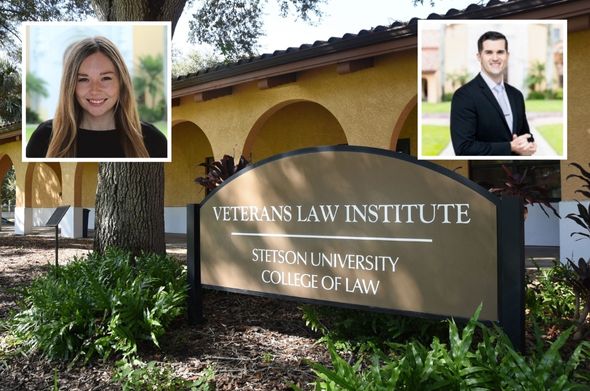Stetson Law Veterans Clinic Supports SCOTUS Amicus Brief

Stetson Law’s Veterans Advocacy Clinic has joined two other law school veterans’ legal clinics on an amicus brief that the National Law School Veterans Clinic Consortium (NLSVCC) has filed in support of a veteran asking the U.S. Supreme Court to hear his case.
The fifth instance Stetson Law has filed with the NLSVCC at the Supreme Court, this brief is a collaboration among the University of Illinois at Chicago Veterans Legal Clinic and the University of Florida Levin College of Law’s Veterans and Servicemembers Legal Clinic.
Stetson Law’s Veterans Advocacy Clinic staff and students played a large role in drafting the document, which was submitted in support of the petitioner in the case Frantzis v. McDonough.
The petitioner, Louis Frantzis, filed a petition for a writ of certiorari seeking review of the U.S. Court of Appeals for the Federal Circuit’s June 2024 decision in his case. The consortium supported his Federal Circuit appeal with an amicus brief, so his counsel contacted the consortium to ask that it consider supporting him again.
Morgan MacIsaac-Bykowski, adjunct professor and associate director of Stetson’s Veterans Law Institute, was especially interested in the project, as she had worked on the Federal Circuit brief and has been following the case since its inception at the U.S. Court of Appeals for Veterans Claims.
About the case
In Frantzis v. McDonough, a divided panel of the U.S. Court of Appeals for Veterans Claims upheld an amendment to the Appeals Modernization Act (AMA) ending the requirement that the judge who conducts a hearing concerning a veteran’s claim before the Board of Veterans’ Appeals Veterans Law be the same judge who issues a decision in the case. The Federal Circuit affirmed this decision.
In its brief, the NLSVCC argued that this change to the law is detrimental to a veteran’s due process rights:
“A veteran’s right to a hearing . . . is close to meaningless without a corresponding right to be heard by the judge who will decide the merits of the case and whether the testimony provided is credible.The Board’s recently adopted practice of judge-swapping—allowing one Board member to preside over the hearing, and a different Board member to actually decide a veteran’s case… is especially harmful to veterans because the Board hearing is a veteran’s chance to convince a judge face-to-face of his credibility.”
Integral support from a student
MacIsaac-Bykowski is especially proud of the work Advanced Veterans Advocacy Clinic student Alex Polidan (’25) did on this brief.
“Alex was able to find a reference to an extremely similar issue in a transcript from a 1994 hearing before the Senate Committee on Veterans’ Affairs,” she said. “In that 1994 hearing, a VA representative expressed his concern that a potential change to the statute similar to the change being considered in Frantzis would waste resources and could be harmful to veterans, and this find really supports our argument.”
Professor MacIsaac-Bykowski enlisted Polidan’s help after seeing his impressive work on the case they are working on together at the U.S. Court of Appeals for Veterans Claims. Alex will be returning to the Veterans Advocacy Clinic as a teaching assistant in the spring.
The Veterans Advocacy Clinic prepares law students to become effective and compassionate attorneys through interdisciplinary collaboration and pro bono advocacy. Such work empowers them to be a voice for veterans with disabilities seeking compensation from the Department of Veterans Affairs in the most difficult cases.
If you are a veteran or spouse of a deceased veteran and you need legal help appealing a decision denying Department of Veterans Affairs disability benefits, you can apply for services by submitting a Client Application Form.
Learn more about Stetson’s Veterans Law Institute.
Post date: Dec. 6, 2024
Media contact: Kate Bradshaw
[email protected] | 727-430-1580